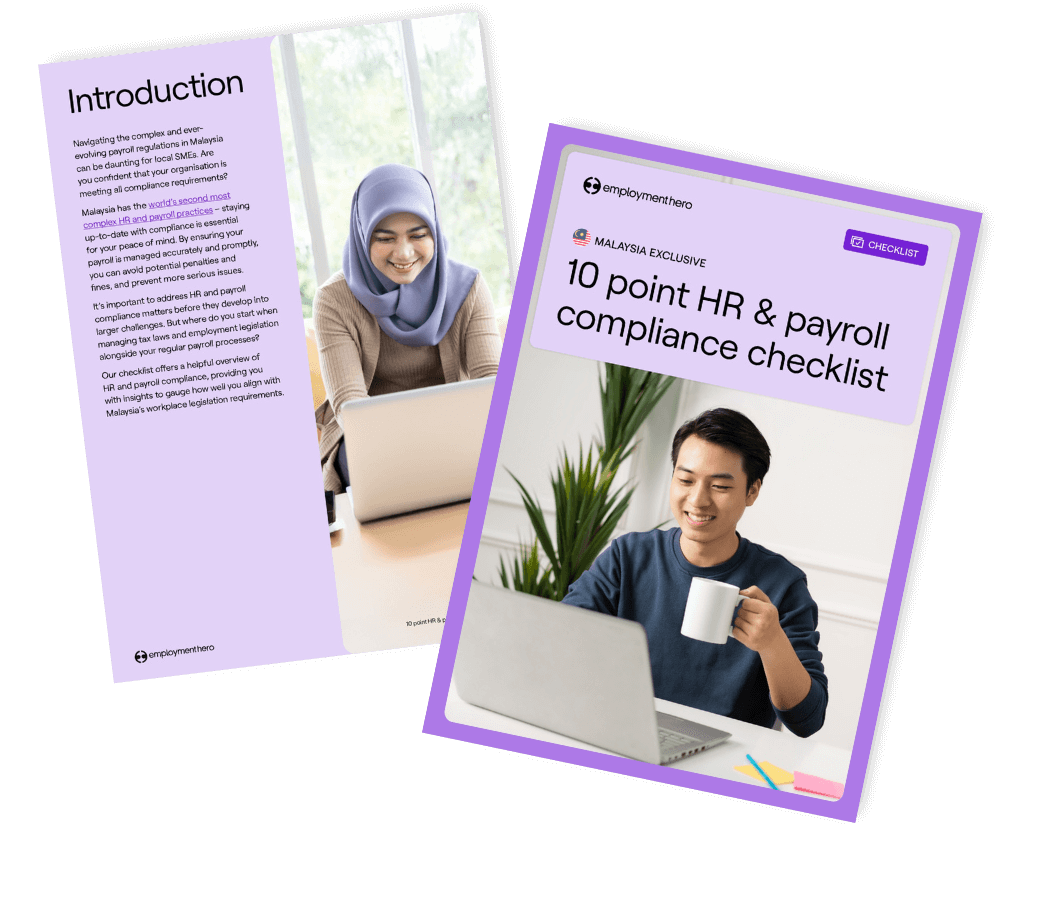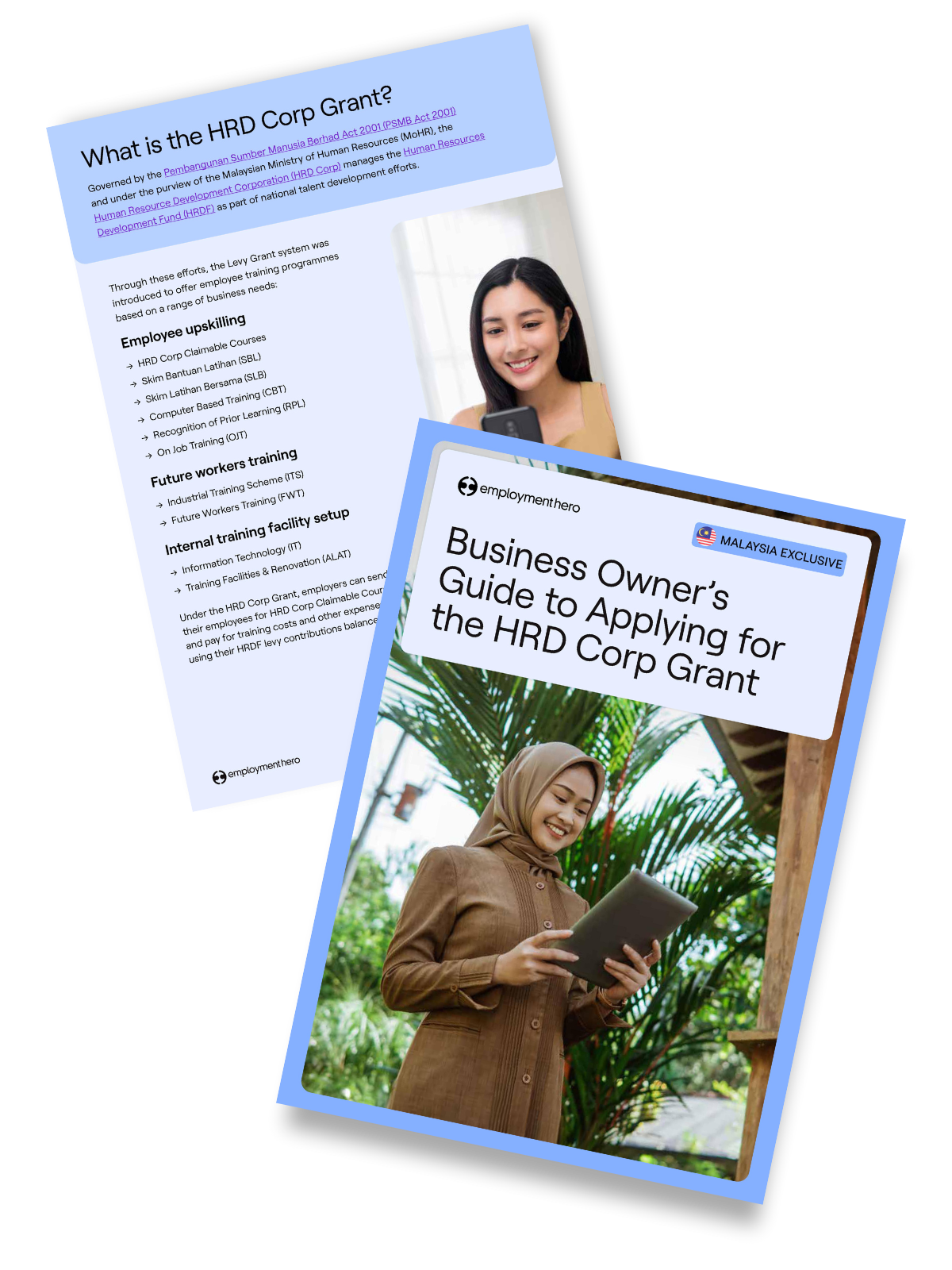Career Progression Plan Template [Free Download]
Published
Career Progression Plan Template [Free Download]
Published
1 min read
This career development plan template is designed to help employees begin thinking about their career goals and the steps they need to advance their professional growth.
It’s suitable for junior to mid-level team members who have big career aspirations and can grow and evolve with your business.
Through a career progression plan, we get a big-picture view of your employee’s goals before zeroing in on the clear steps they can take to make them happen.
How do you use this career development plan template?
Work through this career development plan template collaboratively; talking through it can help your team members organise their thoughts in addition to giving you unique insights into their thinking.
Keep this template in a safe place where your managers and employees can easily reference it.
For best results, attach it to your Employment Hero account on an employee profile.
Disclaimer: While due care has been taken in preparing the document, no responsibility is accepted by the author for the accuracy or suitability of the information contained. All liability is expressly disclaimed for any loss or damage which may arise from any person relying on, using or acting on any information contained therein.
Are career progression plans key to retaining top talent?
A staggering 81% of UK employees have no written career development plans in place with their employer. And we wonder why staff turnover is a challenge for so many businesses.
Retention should be a key priority for employers, but the Great Resignation combined with current economic tensions have proven that employers urgently need to rethink their employee development strategies in order to keep existing staff and attract new talent.
Why are employees leaving their current roles?
Employees are voting with their feet (or by their choice of employer) – demanding better working conditions, decent pay, and flexibility. They want a life outside of work.
We know that workers are looking for more flexibility, but we also believe that workers are experiencing a ‘fulfilment anxiety.’ They’re explicitly looking for ways to find more fulfilling careers.
So what can employers take from this? And how does career transparency increase employee retention?
We’re taking a deep dive into how career progression plans could be the key to recruiting and retaining talent.
What is a career progression plan?
A career progression plan is a documented strategy or roadmap which shows the path that your employee will advance along in your company to meet their professional goals.
It should clearly lay out the employee’s career goals and action plan to reach them, including the skills, competencies, experiences and milestones that the employee can be expected to demonstrate in order to progress.
Ideally, it’s complemented with a learning pathway which identifies what training and education the employee should pursue to reach the milestones identified in their career progression plan. The career progression plan and the learning pathway are two sides of the same career progression coin.
With us so far? Good.
Now take a deep breath because things are about to get bold.

What is career transparency?
Career transparency is the approach of publicly sharing which career paths are available or can be expected in your company. Being transparent about growth opportunities might well be part of your employee value proposition (EVP).
Providing relevant, detailed and accurate job descriptions, posting salary bands, and being honest in the recruitment process all help to cultivate a culture of transparency.
This speeds up the recruitment process and attracts the ideal job candidates who have visibility over what skills they need for a role as well as where they might be able to go in your company.
Being open about this builds trust right from the beginning of the recruitment and hiring process and elevates your employer brand.
But we know employees are also looking for a flexible career plan, so creating rigid, inflexible career paths may not be appropriate for your EVP. Individual, tailored and flexible career paths which feed into workplace hyper-personalisation may be more your company culture.
After all, it might not make sense to post about specific roles if you encourage your employees to tailor roles around their preferences and goals.
Either way, employees are definitely leaving jobs by the masses to seek out more compelling professional development opportunities. Whether you offer fixed or flexible career paths, providing career development opportunities is essential.
Career development opportunities help employees feel valued
In our Employee Movement and Retention report, we considered what employers could do to reduce turnover and optimise our employees’ work experience to help them to feel valued and appreciated. When workers feel fulfilled in a role, they’re more likely to want to stay.
The number one recommendation we have for employers is to provide opportunities for learning and development, and this needs to go straight into the employee’s career development plan.
The two go hand in hand – providing a career growth plan helps your workers feel motivated to reach their learning and long-term career goals. When they feel valued and supported, it increases employee engagement, which boosts retention and also helps to support your brand as an employer.
If you are experiencing issues with retention, don’t despair.
Staff turnover affects even the most successful of businesses. But if you’re engaging with your workers on a regular basis such as in 1:1s, you’ll be able to spot the signs of employees who are a ‘flight risk’.
By listening to your workers, you’ll be able to see the patterns and whether lack of career opportunities is a factor.
Whatever the reason is, once you have the data, you’ll be able to address the issue.
What are employees looking for in career growth?
According to Amy Smyth, Head of Career Management at Right Management Europe, almost a third of workers never discuss their career plans with their manager. But with so many workers looking for career growth, this is surely the year that this changes.
Employers and employees need to engage with each other to identify career growth pathways and how an employee’s skills and strengths fit in with their employer’s business goals.
More so than ever, employers need to think about challenging their employees to take on more responsibility, leadership and skill sets. Companies that don’t do this risk losing incredible talent because they simply can’t recognise that their employees have outgrown their current position.
Four simple steps to create a career progression plan
There’s no one size fits all, unfortunately. Each career growth plan will be unique to the individual.
But never fear, we have some hot tips for you. (Don’t we always?)
1. Determine the career goals of your employee
Talk to each of your employees. Ask them about their aspirations and their long-term goals and listen to what they tell you. Be aware that every employee is different and may have their own ideas about their professional growth.
Make career goals part of your culture that you are open to talking about. If money is an issue, don’t hesitate to have a conversation with your employees about it.
Pro tip: Use our one-to-one meeting template for effective discussions with your employees. Curious about what 1:1s are? Read this.
2. Co-create a plan
Work with your employees to develop a career development plan that reflects both their goals and yours as a business. Use our very convenient career progression plan template, or start using objectives and key results (OKRs) to track goals and progress.
Pro tip: use our intuitive HR software to keep everyone on track and on the ball when it comes to performance management
3. Provide a clear learning pathway
It’s important to provide training and learning opportunities in a clear learning pathway.
While learning pathways should be tailored to each individual, it doesn’t mean you have to create a perfectly unique pathway for each employee – using a learning management system is an efficient way to coordinate this provision while having visibility over employee learning and progress.
Hint: An LMS can also help you measure your ROI on your company investment in learning and development.
4. Actively support your staff
In order to square the circle, you need to keep employee career progression under review, and mentorship or workplace coaching are ideal ways to do this.
Workplace mentorship programs are designed to encourage the personal and professional development of a mentee through the sharing of skills, experiences and insights.
Workplace mentors are highly knowledgeable and qualified professionals who dedicate their time to helping others by offering advice, providing support and answering questions.
Put simply, their role is to foster the growth and development of less experienced individuals through challenging tasks, resources and encouragement.
On the other hand, workplace coaching is the active role that leaders take in training, developing and encouraging their teams. Employee coaching covers everything from helping team members complete courses to providing constructive criticism on a piece of work.
Use one or both to support your employees, alongside more formal performance reviews, to encourage them in their career progression.
Hint: Coach employees with our employee coaching plan template

Why offering a career plan to employees is a win-win
Employers that offer compelling career progression opportunities and learning pathways have the best chance of retaining those workers.
We would agree that career progression plans are key to retaining talent, but only so far as they are consistent with your company culture.
Cultures that transparently promote and support learning and growing are more likely to retain employees and attract talent.
This is about trusting your employees and empowering them in their own career development while you also grow your business. Together is how employees and companies can thrive.
Ultimately, managing employee retention rate starts with recruitment but is sustained through culture.
We live by that. That’s why it’s built into our employee performance management platform.
We’ll be over here, celebrating your success – and the success of your employees too, of course.
And don’t forget to save a copy of our career progression template.
Download our career development plan template now.
Related Resources
-
 Read more: 10 point HR and payroll compliance checklist
Read more: 10 point HR and payroll compliance checklist10 point HR and payroll compliance checklist
Get peace of mind with our 10 point HR and payroll compliance checklist.
-
 Read more: Business Owner’s Guide to Applying for the HRD Corp Grant
Read more: Business Owner’s Guide to Applying for the HRD Corp GrantBusiness Owner’s Guide to Applying for the HRD Corp Grant
Find out if you are eligible for the HRD Corp Grant and how to apply for it here.
-
 Read more: From Hi to Hired: Hire Faster, Hire Smarter.
Read more: From Hi to Hired: Hire Faster, Hire Smarter.From Hi to Hired: Hire Faster, Hire Smarter.
This session will equip you with techniques to streamline hiring, enhance candidate experience.







